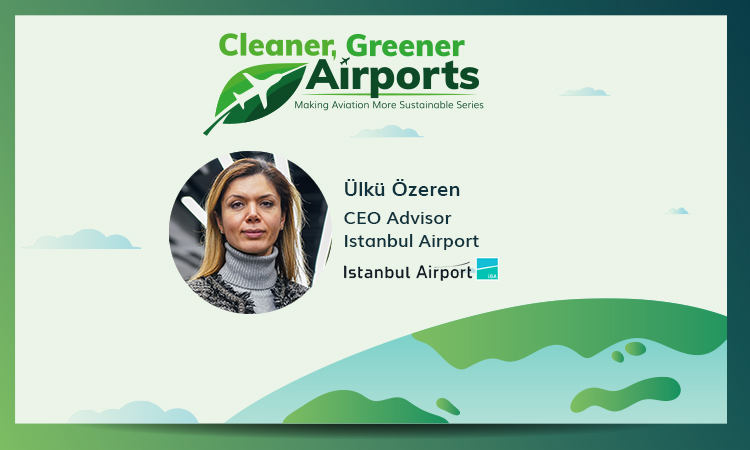Cleaner, Greener Airports: Making Aviation More Sustainable – Istanbul Airport
- Like
- Digg
- Del
- Tumblr
- VKontakte
- Buffer
- Love This
- Odnoklassniki
- Meneame
- Blogger
- Amazon
- Yahoo Mail
- Gmail
- AOL
- Newsvine
- HackerNews
- Evernote
- MySpace
- Mail.ru
- Viadeo
- Line
- Comments
- Yummly
- SMS
- Viber
- Telegram
- Subscribe
- Skype
- Facebook Messenger
- Kakao
- LiveJournal
- Yammer
- Edgar
- Fintel
- Mix
- Instapaper
- Copy Link
Posted: 16 April 2021 | Ülkü Özeren | No comments yet
In the latest instalment of International Airport Review’s exclusive series, Ülkü Özeren, CEO Advisor at Istanbul Airport, details the airport’s work to ensure a sustainable aviation future and a green recovery post-pandemic.


2020 was a very challenging year for everyone across the world. The COVID-19 pandemic has shown how crucial early action is to an emerging crisis and that delays have high societal and financial costs. Having been ‘shut down’ globally, the aviation industry has experienced catastrophic circumstances. The same is valid for climate change – delaying or reducing the rate at which emission reductions are made today will require more significant sustainable cuts in the future, with higher costs.
The COVID-19 pandemic is an inflection point that provides the opportunity for businesses and governments to reset and invest for the long-term, urging for a whole-scale transformation of every sector of the global economy”
The 2020s will be a pivotal decade for achieving net zero emissions by 2050, as targeted by the European Commission (EC). The COVID-19 pandemic is an inflection point that provides the opportunity for businesses and governments to reset and invest for the long-term, urging for a whole-scale transformation of every sector of the global economy, unprecedented innovation and multi-actor governance. The aviation industry has started to consider decarbonisation efforts more seriously to tackle climate change, combined with a green recovery. During the recovery phase of the industry, environmental concerns regarding climate change and the importance of sustainability appears poised to continue to influence future aviation. The long-term existence of the aviation industry depends on an entirely sustainable recovery.
Putting sustainability at the heart of our airport
While adapting our airport to pandemic conditions with state-of-the-art applications, to ensure the continuity of aviation activities and operations at Istanbul Airport (IST), sustainability is at the top of our agenda. In 2020, being the largest building under one roof in the world, our terminal building was awarded the LEED GoldCertificate by the U.S. Green Building Council. In addition to our terminal building, our Air Traffic Control (ATC) Tower and State Guest House have also been awarded with LEED certificates. LEED Certification is a long-running process from design to the completion of buildings and covers a wide range of aspects that involve several disciplines. The system evaluates the buildings under various categories, such as: sustainable land; water efficiency; energy and atmosphere; materials and resources; in-door environmental quality; innovation in design; or regional priority credits. Thanks to the use of energy-efficient mechanical equipment, efficient lighting fixtures and an energy-efficient façade design, Istanbul Airport’s energy consumption reduced by over 22 per cent when compared to the base building defined in ASHRAE, an internationally recognised standard. Renewable energy projects have been supported by offsetting 80,000 tonnes of CO2. Istanbul Airport’s stakeholders’ operating office buildings, hangars and cargo buildings have also followed LEED requirements; thus, a total of two million square metres of buildings have been designed and built in accordance with green building schemes, resulting insignificant energy and water savings, in addition to other sustainability benefits.
Reducing and recycling with green technology
At Istanbul Airport, ground handling companies are encouraged to use electrified vehicles. In addition, all stakeholders operating at our airport are obliged to operate electrified vehicles in enclosed places. It should also be emphasised that Istanbul Airport’s master plan has been developed with a consideration of minimising direct and indirect greenhouse emissions significantly.
It should also be emphasised that Istanbul Airport’s master plan has been developed with a consideration of minimising direct and indirect greenhouse emissions significantly”
Recently, Istanbul Airport, which has fulfilled its obligations within the framework of the Airport Carbon Accreditation programme – which was commenced by Airports Council International (ACI) Europe in 2009 – obtained a Level 1 ‘Mapping’ carbon management certificate, thereby joining the global community of climate-smart airports. Sustainability is at the very heart of all of processes at Istanbul Airport. While continuing our operations in line with our environmental and sustainability principles, we are also making the utmost effort to protect the climate.
Regarding water management, we are treating all of our wastewater and recycling for irrigation of Istanbul Airport’s landscape features. For water efficiency, water-saving batteries and reservoirs are in use at the airport, while the use of gray water in reservoirs is aimed at reaching over 50 per cent reduction in water consumption of the building. Selection of domestic plant species that require less water in the landscaping areas, as well as the use of treated water in irrigation, helps to save water by 100 per cent. Also, water risks are constantly evaluated and our actions planned accordingly.
Effective waste management strategies
At Istanbul Airport, we consider compliance with sustainability principles the most important component of our corporate culture. Based on this mindset, we have targeted zero waste as a key success factor and put sustainability at the core of all airport activities.
All employees of companies operating at Istanbul Airport are trained in the relevant aspects of waste management, in parallel with raising awareness on our zero waste goal”
Starting from the top, the Zero Waste Declaration was a very important step taken by İstanbul Grand Airport (İGA) upon the commencement of operations. Under the leadership of İGA, our CEO, Kadri Samsunlu, and all Istanbul Airport stakeholders signed the declaration to demonstrate their commitment to taking necessary measures to separate waste at the source and minimise waste significantly. With iGA’s waste management system, wastes are segregated at the source and then at our semi-automatic waste separation facility, before being sent to licensed recycling facilities.
All employees of companies operating at Istanbul Airport are trained in the relevant aspects of waste management, in parallel with raising awareness on our zero waste goal. Stakeholders are encouraged to develop innovative projects in this key area. Continuing operations serving the mission of zero waste, and meeting the Ministry of Environment and Urbanisation requirements, Istanbul Airport was awarded with a Zero Waste Certificate in 2020.
Key factors for successful implementation of sustainability
We optimise our energy consumption through a smart energy management system at our airport and continually improve performance through energy efficient technologies and best practices. In 2020, we strengthened our efforts with the ISO 50001 Energy Management System certification to manage energy efficiently, identifying risks and reducing them systematically, thus protecting the environment, increasing the effectiveness of our efforts to tackle climate change and making processes sustainable.
Since opening, we have brought important aviation standards to life in a very short time period, and our aim is to take the lead in the development and progress of the aviation industry from now on”
Certified with the ISO 14001 Environmental Management standard in 2020, we carefully put relevant environmental procedures in place to manage all environmental risks and impacts with a lifecycle assessment approach. By doing this, we ensure sustainability within all of our processes. Continuous, systematic, effective communication is ongoing with our stakeholders to achieve environmental, energy and waste goals together.
Since opening, we have brought important aviation standards to life in a very short time period, and our aim is to take the lead in the development and progress of the aviation industry from now on.
Performing our efforts under a three-pillar sustainability strategy – Respect to Environment, Respect to Community and Sustainable Economic Development – we’d like to state our motto: “We Respect for Future.” As Istanbul Airport, we believe that all of these achievements play a vital role during the COVID-19 pandemic. These technologies are not only important for complying safety and health measures, but for sustainable reasons. The further we move into sustainable and smart mobility with digital age technologies, the greater higher added value we create. Our desire is to be a responsible global hub airport, and we are fully committed to achieving just that. As a reflection of our respect for the world and, most notably, with the sustainability approach that we have committed ourselves to, we will work with all of our strength to leave a viable world to future generations. We will continue our work by contributing to the environment that we live in, our country and the rest of the world in line with this goal.
Ulku Ozeren has worked for Istanbul Airport since January 2014. She was involved at a very early stage of the project with the preparation of the Environmental and Social Impact Assessment Study in IFC Standards. Under the Environment and Sustainability Department, she has managed five main topics for the Istanbul New Airport Project: Environmental Management, Social Management, Sustainability, Wildlife Management for flight safety and Ecological Management. With 24 years of professional experience working for international projects, she has gained wide knowledge in the implementation of IFC Performance Standards and Equator Principles, a variety of sustainability mechanisms and environmental management systems, in addition to international and national environmental requirements. She has developed Istanbul Airport’s Environmental and Sustainability Standards for iGA and all third parties operating in the airport. She is now working at iGA as CEO Advisor.
Related topics
Airside operations, Cleaner, Greener Airports: Making Aviation More Sustainable Series, COVID-19, Emissions, Machinery, Sustainability, Sustainable development, Terminal operations


















